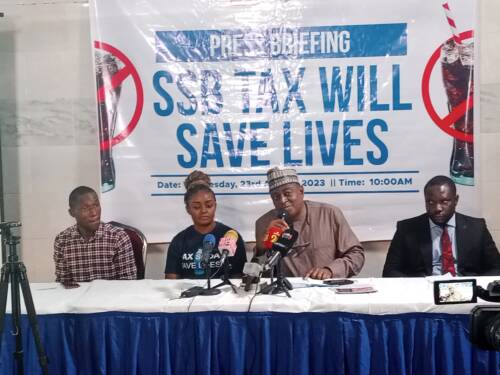The National Sugar-Sweetened Beverages Tax Coalition has called on the federal government not to succumb to the blackmail of the producers of soft drinks as it strives to reduce diet-related diseases in the country.
It said for the desired impact of reduction in consumption of soft drinks, the tax must be immediately increased to a minimum of 20 per cent of the final retail price.
Addressing a press conference on behalf of the coalition on Wednesday in Abuja, the Executive Director of Corporate Accountability and Public Participation Africa (CAPPA), Akinbode Oluwafemi, said the federal government should begin a legislative process for the sustainability of the tax, that will be adjustable for inflation with provisions on earmarking.
He insisted that the press briefing goes beyond to bringing attention to the important issue of SSBs tax, but to also urge media practitioners to be alert to deliberate misinformation coming from certain sections — those working tirelessly to undermine the collective wellbeing of Nigerians through their daily attack on government pro-health initiatives aimed at promoting public health by weaning Nigerians off unhealthy diets, and unhealthy lifestyles.
Oluwafemi recalled that in 2021, the federal government imposed a N10 per litre Excise Duty on Sugar-Sweetened Beverages.
He explained that the tax was principally to help reduce the over-consumption of SSBs which have links to more than 15 types of cancer, obesity, diabetes, and other non-communicable diseases (NCDs).
According to him, SSBs, popularly called Soft Drinks, have been confirmed by the World Health Organisation (WHO) and other national and international health bodies, to have a hard-hitting impact on health, social, economic, and environmental wellbeing of consumers and our communities.
Oluwafemi said the tax covers different categories of sugar-sweetened non-alcoholic beveragesand implementation began in June 2022.
He maintained that tax is effective in reducing consumption of SSBs in all the countries of the World where they have been effectively introduced and managed.
His words: “Interestingly, manufacturers of these unhealthy products through various front and ally groups including the Manufacturers Association of Nigeria, Organised Private Sector, and other nameless groups have continued to blackmail the government with their heavy media campaign of misinformation and threat to the federal government.
“They have also constantly attacked civil society groups working to ensure that Nigeria institute effective food policies that will reduce diet-related diseases in the country.”
Oluwafemi added that while the aim was to reduce overconsumption, the beverages are non-nutritive and have no use in the body.
The coalition stated: “The current N10/litre is insignificant, it has been absorbed by the industry.
“For the desired impact of reduction in consumption and decrease in NCDs, the tax must be immediately increased to a minimum of 20% of the final retail price of SSBs.
“Government must not succumb to the blackmail of the producers of SSBs. Instead, the government should begin a legislative process for the sustainability of the tax, that will be adjustable for inflation with provisions on earmarking.
“Government must in good faith begin to account for the taxes collected and a breakdown of how it has been expended.”















